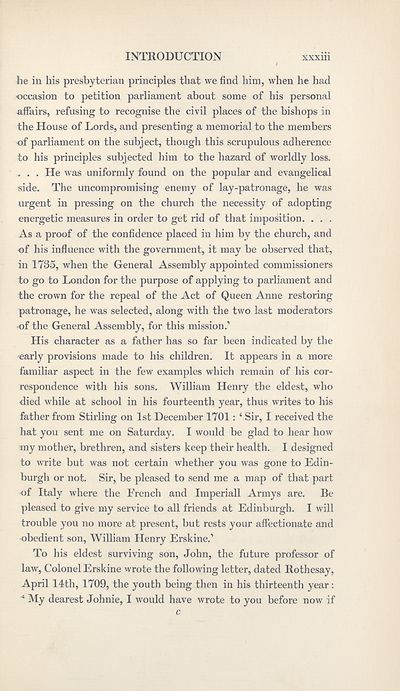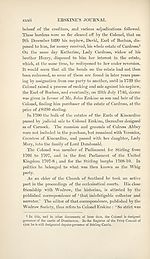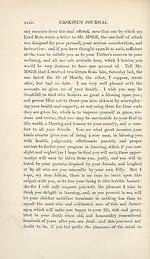Series 1 > Journal of the Hon. John Erskine of Carnock, 1683-1687
(42) Page xxxiii
Download files
Complete book:
Individual page:
Thumbnail gallery: Grid view | List view

INTRODUCTION xxxiii
he in his presbyterian principles that we find him, when he had
occasion to petition parliament about some of his personal
affairs, refusing to recognise the civil places of the bishops in
the House of Lords, and presenting a memorial to the members
of parliament on the subject, though this scrupulous adherence
to his principles subjected him to the hazard of worldly loss.
. . . He was uniformly found on the popular and evangelical
side. The uncompromising enemy of lay-patronage, he was
urgent in pressing on the church the necessity of adopting
energetic measures in order to get rid of that imposition. . . .
As a proof of the confidence placed in him by the church, and
of his influence with the government, it may be observed that,
in 1735, when the General Assembly appointed commissioners
to go to London for the purpose of applying to parliament and
the crown for the repeal of the Act of Queen Anne restoring
patronage, he was selected, along with the two last moderators
of the General Assembly, for this mission.’
His character as a father has so far been indicated by the
early provisions made to his children. It appears in a more
familiar aspect in the few examples which remain of his cor¬
respondence with his sons. William Henry the eldest, who
died while at school in his fourteenth year, thus writes to his
father from Stirling on 1st December 1701: ‘ Sir, I received the
hat you sent me on Saturday. I would be glad to hear how
my mother, brethren, and sisters keep their health. I designed
to write but was not certain whether you was gone to Edin¬
burgh or not. Sir, be pleased to send me a map of that part
of Italy where the French and Imperiall Armys are. Be
pleased to give my service to all friends at Edinburgh. I will
trouble you no more at present, but rests your affectionate and
obedient son, William Henry Erskine.’
To his eldest surviving son, John, the future professor of
law, Colonel Erskine wrote the following letter, dated Rothesay,
April 14th, 1709, the youth being then in his thirteenth year:
* My dearest Johnie, I would have wrote to you before now if
c
he in his presbyterian principles that we find him, when he had
occasion to petition parliament about some of his personal
affairs, refusing to recognise the civil places of the bishops in
the House of Lords, and presenting a memorial to the members
of parliament on the subject, though this scrupulous adherence
to his principles subjected him to the hazard of worldly loss.
. . . He was uniformly found on the popular and evangelical
side. The uncompromising enemy of lay-patronage, he was
urgent in pressing on the church the necessity of adopting
energetic measures in order to get rid of that imposition. . . .
As a proof of the confidence placed in him by the church, and
of his influence with the government, it may be observed that,
in 1735, when the General Assembly appointed commissioners
to go to London for the purpose of applying to parliament and
the crown for the repeal of the Act of Queen Anne restoring
patronage, he was selected, along with the two last moderators
of the General Assembly, for this mission.’
His character as a father has so far been indicated by the
early provisions made to his children. It appears in a more
familiar aspect in the few examples which remain of his cor¬
respondence with his sons. William Henry the eldest, who
died while at school in his fourteenth year, thus writes to his
father from Stirling on 1st December 1701: ‘ Sir, I received the
hat you sent me on Saturday. I would be glad to hear how
my mother, brethren, and sisters keep their health. I designed
to write but was not certain whether you was gone to Edin¬
burgh or not. Sir, be pleased to send me a map of that part
of Italy where the French and Imperiall Armys are. Be
pleased to give my service to all friends at Edinburgh. I will
trouble you no more at present, but rests your affectionate and
obedient son, William Henry Erskine.’
To his eldest surviving son, John, the future professor of
law, Colonel Erskine wrote the following letter, dated Rothesay,
April 14th, 1709, the youth being then in his thirteenth year:
* My dearest Johnie, I would have wrote to you before now if
c
Set display mode to:
![]() Universal Viewer |
Universal Viewer | ![]() Mirador |
Large image | Transcription
Mirador |
Large image | Transcription
Images and transcriptions on this page, including medium image downloads, may be used under the Creative Commons Attribution 4.0 International Licence unless otherwise stated. ![]()
| Scottish History Society volumes > Series 1 > Journal of the Hon. John Erskine of Carnock, 1683-1687 > (42) Page xxxiii |
|---|
| Permanent URL | https://digital.nls.uk/127089825 |
|---|
| Attribution and copyright: |
|
|---|
| Description | Over 180 volumes, published by the Scottish History Society, containing original sources on Scotland's history and people. With a wide range of subjects, the books collectively cover all periods from the 12th to 20th centuries, and reflect changing trends in Scottish history. Sources are accompanied by scholarly interpretation, references and bibliographies. Volumes are usually published annually, and more digitised volumes will be added as they become available. |
|---|


